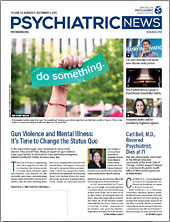People with psychiatric disorders frequently have co-occurring sleep disorders that are undiagnosed or undertreated, sleep medicine expert Ruth Benca, M.D., Ph.D., said during a lecture at the American Academy of Sleep Medicine and Sleep Research Society annual meeting in June. And symptoms of psychiatric and sleep disorders overlap, which further complicates diagnosis and treatment. The solution to improving outcomes in these patients, she asserted, is comprehensive, patient-centered care by a multidisciplinary team.
Despite decades of laboratory-based research exploring brain-wave activity, sleep-stage timing, interruptions in breathing, and other sleep characteristics in people with psychiatric disorders, Benca said that assessing sleep architecture (the structural organization of sleep) is not regarded as a useful tool for diagnosing psychiatric disorders.
“In the sleep clinic, we don’t usually assess patients for psychiatric symptoms,” she told Psychiatric News. “And in the psychiatric clinic, I’m always surprised at how poorly we evaluate patients for sleep disorders. Asking, ‘Is your sleep OK?’ is not enough.”
Sleep Problems May Worsen Psychiatric Disorders
Patients seeking help for sleep and psychiatric symptoms may complain of insomnia or excessive daytime sleepiness, called hypersomnia. About 40% of people reporting either symptom have a psychiatric illness, said Benca, who is professor and chair of the Department of Psychiatry and Human Behavior at the University of California, Irvine.
More than 60 studies have documented an epidemiological relationship between insomnia and suicidal ideation, attempts, and death. Short sleep duration—commonly defined as less than seven hours of sleep a night—has been linked to increased suicidal ideation and attempts, even after adjusting for psychiatric disorders.
The recent, rapid rise in the U.S. suicide rate—up by 28% from 1999 to 2016—has spurred heightened efforts to improve preventive strategies. Addressing sleep problems is one such tactic, Benca said.
In a recent study, Benca and colleagues confirmed undetected obstructive sleep apnea (OSA) in adults with suicidality and major depressive disorder (MDD).
OSA, which affects an estimated 10% of men and 3% of women aged 30 to 49 years, causes frequent pauses in breathing that disrupt sleep. It triggers symptoms that overlap those of depression including daytime fatigue, loss of interest in one’s usual activities, problems with attention and concentration, decreased motivation, and decreased libido. About one-third of those with OSA also report anxiety.
While conducting a randomized clinical trial of 125 adults with suicidality and MDD—none of whom was known to have OSA—Benca and colleagues found that 14% met the criteria for OSA. In their report, published in the September issue of the Journal of Psychiatric Research, they concluded, “A high degree of suspicion is warranted for OSA in suicidal patients with MDD and for patients with treatment-resistant depression.”
In other words, a treatment-resistant mental illness may signal that another undiagnosed or undertreated condition is complicating response to the psychiatric treatment. “Treatment-resistant depression may be treatment-responsive apnea,” Benca explained, “and treatment-resistant apnea may be treatment-responsive depression.”
Sleep disorders also are common in people with schizophrenia: Nearly one-sixth have OSA, and one-third have insomnia. Furthermore, insomnia often precedes a new onset or worsening of psychosis, Benca said, and also predicts suicidal behavior in people with schizophrenia.
Among military veterans with posttraumatic stress disorder, the prevalence of OSA has been reported to be over 55%, she said.
Psychotropics May Complicate Sleep Problems
Further complicating the relationship between psychiatric disorders and sleep problems is that medications used to treat psychiatric disorders may increase a patient’s risk of OSA by promoting weight gain, Benca noted. Additionally, sedative-hypnotic drugs, which are prescribed for insomnia, may worsen OSA by making it harder for patients to wake up and start breathing again. Narcotics and some anticonvulsants may contribute to central apneas.
People with psychiatric disorders also have higher rates of circadian rhythm disorders and restless legs syndrome (RLS). The latter, which involves an uncontrollable urge to move one’s legs, may be exacerbated by antipsychotics and antidepressants. Children with RLS sometimes are misdiagnosed with attention-deficit/hyperactivity disorder (ADHD), Benca added, and ADHD medications may exacerbate RLS symptoms.
Treatment outcomes improve when psychiatrists and other clinicians address patients’ psychiatric and sleep diagnoses, as well as their overall health, Benca said. To provide comprehensive care, physicians may need to involve the patient’s family, pharmacist, dietician, social worker, and others, she said.
“Patient-centered care,” Benca said, “often requires a multidisciplinary approach.”
Benca and colleagues reported no financial support for their study on OSA in patients with MDD and suicidality. ■
“Prevalence of Obstructive Sleep Apnea in Suicidal Patients With Major Depressive Disorder” is posted
here.

